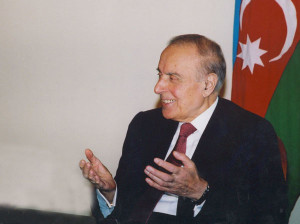



 Director of the Institute of Mathematics and Mechanics, ANAS professor Misir Mardanov opened the Institute seminar and spoke about the national leader Heydar Aliyev as a prescient personality and his important works in creation of contemporary Azerbaijan Republic.
Director of the Institute of Mathematics and Mechanics, ANAS professor Misir Mardanov opened the Institute seminar and spoke about the national leader Heydar Aliyev as a prescient personality and his important works in creation of contemporary Azerbaijan Republic.
The world history has proved that the power, intellect, bravery, political will and wisdom of personalities have indispensable role in the life of the people to whom they belong and the state that they created. Architecture and creator of Azerbaijan state, national leader Heydar Aliyev is among these personalities.
The participants commemorated the national leader with one-minute silence.
On December 09, 2015, 10.00 featured a report by Professor K. R. Aydazade, entitled “On an approach to feedback control for systems with lumped parameters”.
The report is dedicated to optimal feedback control problems with respect to objects described by systems of nonlinear ordinary differential equations under different forms of feedback both on state and on output. It is assumed that the initial state of the object can take on values from a priori known set with the known density (weighting) function, and the time-constant parameters of the object take on values from the given set with the known density (weighting) function.
Control of the dynamics of the investigated process is implemented based on the presence of feedback of the object’s current state or the state of the object’s output , which is determined by the known nonlinear function of its state : .
For the synthesized functions, we have introduced the notion of “zonality” of the control’s parameters.
We analyzed the cases of continuous and discrete feedback, for which we considered various forms of functional dependence of the parameters of the zonal control actions from the state vector or the output vector.
We developed the corresponding software and carried out numerical experiments on several test problems. We also made a comparison between the solutions to the feedback zonal control problems under the feedback on the object’s output and state.